What It's Like Being a U.S. Healthcare Worker Fighting Coronavirus
No tests, limited supplies, and overwhelmed hospitals. This is just the beginning.
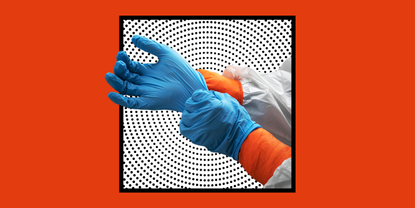

While some of us are sitting comfortably on our couch deciding which Netflix show we're going to binge-watch after we finish working from home, healthcare workers—nurses, doctors, aides, lab technicians, etc.—around the country are preparing for massive shifts at their respective clinics and hospitals to help fight the novel coronavirus, COVID-19. As of press time, the virus has caused 7,800 deaths worldwide, with nearly 200,000 people across the globe infected. The cases are rising throughout the U.S. every day. It will get worse before it gets better.
Although we've been aware of the rapidly-growing virus, described as a public health emergency since January, it took the NBA canceling the remainder of its regular season, Tom Hanks publicly announcing his diagnosis, and the World Health Organization classifying it as a pandemic on March 11, for this country to take it seriously. For regular citizens, this means social distancing. For healthcare workers, this means testing (once tests finally become widely available) and treating patients. Much like the rest of us, these men and women are turning to an unprepared government on what to do. For them, working from home isn't an option.
Marie Claire spoke to nurses and doctors around the country who are on the frontlines of the Coronavirus pandemic. Here, they share how they're navigating these unprecedented times, common misconceptions about COVID-19, and what we need to do to "flatten the curve."
Hospital Briefings Varied Widely
"We first got prepped about the virus three weeks ago—on February 27. They mentioned it in our daily huddle before we go to work because we had a suspected patient. Then we got an email. 'While there have been no cases in Florida, we’re preparing for the potential spread...please anticipate bi-weekly updates.' It also had the criteria to test a patient for it." —Madison K., 24, BSN, RN, Jacksonville, Florida
"I got briefed 4 or 6 weeks ago. The messaging started off relatively light, making sure that everybody’s practicing proper hand hygiene, if you’re sick stay home, those sort of things. Each week things have escalated. February and March is conference time for a lot of specialists, so national meetings were taking precautions and now every national meeting has been canceled or postponed." —Dr. Tania Elliott, 37, Associate Attending, Division of Infectious Diseases, Department of Medicine, NYU Langone Health
"I first started getting briefed around two or three weeks ago. Initially, I was cautiously optimistic that we would see some cases, but nobody was sure how fast it would spread. We didn’t have the Italian experience when we first started getting briefed." —Dr. Ali Raja, 42, Executive Vice Chairman of Emergency Medicine, Massachusetts General Hospital
"It wasn’t until Donald Trump declared a national emergency that people were like, we have to start putting a protocol in place as a unit and as a hospital. Now we’re being briefed multiple times per day." —Lara S., 23, RN, California
Stay In The Know
Get exclusive access to fashion and beauty trends, hot-off-the-press celebrity news, and more.
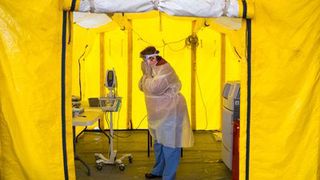
Tests Are Limited
"Our hospital is a smaller hospital—our ICU only has 24 beds. We’ve had people that just can’t get tested. I was floated to another unit the other day and we got a patient who we sent the test out for, so I was geared up. The next day, I was back in my unit and I was like 'What happened? Was she positive?' Meanwhile, Quest canceled the test because she didn’t meet criteria. Nobody’s being tested, so these numbers that we’re seeing are probably going to triple. It’s not the hospital—the hospital is doing everything it can—it’s the country. We don’t have enough tests. I don’t think there should be a criteria right now. " —Madison K.

"Once we start doing more tests, we’ll probably see the mortality rates decrease. A lot of people walking around are testing positive who are asymptomatic or have a very mild disease. You’ll start to see there be a better ratio of mild illness to severe illness. The question is...does it necessarily make a difference? Is it going to change the precautions we’re taking right now? While it’s very important to have additional tests, I do think there’s some rhyme or reason to not test people who are mild or asymptomatic. If you’re sick, stay home. Reserve the testing for people who are acutely ill. I’m not a huge fan of doing a test just to know you have it unless there’s a surplus of tests." —Dr. Elliott
"Part of the reason why the numbers are low are because we’re not testing everybody yet. Once we begin testing more people, we’re going to be finding more people who test positive. I’ve been asked when we’re getting more tests a dozen times today by patients, and I just don’t know. I hear different things on the news just like them. Unfortunately, despite the fact that we have a robust system, a lot of times we are reacting to what we hear on the news just as much as our patients are." —Dr. Raja
Supplies Are Running Low
"They took all of our masks from our supply room. So if we get a patient that’s in isolation, they’ll be handing us a few masks in order to take care of that one patient before our shift. If somebody wasn't feeling good, like even if a nurse had a cold or something, they should be wearing a surgical mask with other patients so they wouldn’t get them sick, but we don’t even have those available right now." —Madison K.
"It’s a challenge, particularly around masks. I can’t emphasize enough that if you’re not healthcare personnel, don’t go buying 95 masks and respirators. Those should be left to healthcare personnel." —Dr. Elliott
"People are overprotecting themselves, and now we’re lacking the supplies we need for the patients we absolutely have to be gowned up for. Some people have gone into every single room with a mask on. We can’t be wasting a mask on someone who doesn’t need it. The supplies haven’t run out yet, but they’re on their way to running low and we’re trying to do our best in our unit to make sure we’re preserving everything we have." —Lara S.
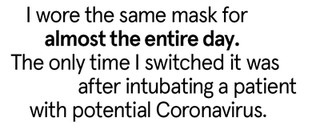
"Hospital-wide, even though we appear to have enough supplies right now, we’re all conserving them. I wore the same mask for almost the entire day. The only time I switched it was after intubating a patient with potential Coronavirus. I took it off and put on a new mask. Generally, I try to wear the same mask for the entire day." —Dr. Raja
Hospitals Are Facing Overwhelming Demand
"Regarding elective surgeries and non-urgent medical appointments, a week-and-a-half ago the messaging was, 'Oh you know, if it’s non-essential you may want to think about postponing it. Otherwise, we want people to continue on with their everyday lives.' Fast forward to today and elective surgeries at two major hospitals in New York City have now been canceled. It’s not necessarily about the risks of the patients getting the virus—it’s about the hospitals not being able to accommodate the demand of patients. It’s become more of a personnel issue than anything else. We have to cancel non-emergency things so that we can staff up for the influx of patients that we’re going to see. In my entire career, this is the first time I’ve ever seen such a robust response." —Dr. Elliott

"We’re not dealing with a lack of personnel yet, but we fully expect to. We’ve had a number of doctors and nurses who have been furloughed for a potential exposure. Fortunately, almost all of them have been able to come back to work after testing negative. But we are also implementing a number of backup plans so when—not if—our physicians and nurses end up going home because they’re sick, we have backups and backups to our backups. Other doctors around the country, especially those on the West Coast, have already gotten hit really hard with it. We are definitely anticipating a shortage in the coming weeks.
What really needs to happen, and what we’re working on protocols of, is that when patients start getting a little bit better we need to get them out of the hospital. We can’t keep them in the hospital once they’re no longer sick enough to be there—even if they have the Coronavirus. We have to make room." —Dr. Raja
Their Advice for When to Go to the Doctor
"If your breathing is comprised, go to the doctor. If you call 911 rescue, you need to tell the dispatcher that you’re suspicious that you have [COVID-19] so they’re not spreading it when they’re transporting you to the hospital or going to pick somebody else up. I think it’s important that people know what qualifies you to be in the hospital or not. Just because you have a fever doesn’t mean you should be in the hospital. You can take care of that at home. If it’s life-threatening then, yes, go to the hospital." —Madison K.
"I’m an allergist and an immunologist. I have patients I see at Bellevue Hospital, which is a public hospital, and it’s about to be allergy season. A lot of patients come in and they’re not sure if they’re sick or if they have allergies. I happen to be pregnant, so I started very early on transitioning all of my visits to telehealth visits where I can connect with patients on video. I think it’s really important for patients, particularly with asthma, to make sure they’re maintaining their medications and their chronic conditions are under control. At the same time, it’s mitigating my level of risk being exposed to patients that don’t even realize how sick they are. When they have a cough, they don’t realize they have a low-grade fever and the next thing you know I’m exposed." —Dr. Elliott
How They're Feeling Now
"At first, I was kind of freaking out because we didn’t have a great plan. Now I feel a little better because I don’t think there’s a way to stop it. There’s only so much we can do. I’m not worried so much about myself getting sick, I’m worried about other people. These elderly people are going to be screwed if they aren’t going to be able to get the healthcare they need." —Madison K.
"I have to have conversations with fellow doctors. Can I come in? Are you repurposing rooms in your clinics for sick people? That’s the biggest issue now. Yes, Tania, you need your checkup for prenatal care and that’s super important, but there’s a life-or-death emergency right now and the hospitals are overrun. I’m nervous for my own health and making sure I can get proper prenatal care, but I’m taking it day-by-day and waiting to connect with my doctors. I'm only keeping milestone appointments. I’m trying not to over-utilize the system myself." —Dr. Elliott

"I will admit that when I first heard about this a couple of months ago, I didn’t think it would be nearly as serious as it is now. I’m concerned that this is going to be a strain on our healthcare system like we haven’t seen in decades. We need to be doing everything we can to flatten the curve. The number of patients who come in might not change, but the frequency with which they do can go down so we see the same number of patients over a longer period of time and we don’t overwhelm our hospitals." —Dr. Raja
"I work with kids in the pediatric unit, so we might be experiencing less of it right now, but that can all change. Everyone’s a little bit nervous about it—nobody wants a case to come to their floor. Originally, I thought this was being way blown out of proportion after seeing people wear masks on planes for no reason. I even felt like that in the beginning of last week. Honestly, once a national emergency was declared, that’s when I knew it was a lot more serious and would be affecting a lot more people than I initially thought. To see the numbers rise in the past few days has been insane." —Lara S.
How They're Protecting Their Own Families
"The first thing I’m going to do when I get home is go upstairs and take all of my clothes off and throw everything in the washer before giving [my son] a hug. We’ve got to be careful and we have to distance ourselves from our families as soon as we get home so we can completely disinfect ourselves. I never had to do that before in my past 16 years in medicine. It’s nothing like any of us have seen before, no matter how long you’ve been practicing." —Dr. Raja
Debunking COVID-19 Myths
"There’s a lot of 'This is just like the flu, wash your hands and you’ll be fine.' People are like 'I should avoid big gatherings, but I can still go out to dinner. I can still go to parks with kids and playgrounds.' People aren’t taking social distancing seriously. I wish there was more of, 'Here’s what my family and I did. Here’s what you can do when you’re home with your family, like playing in your backyard, read books, watch a movie.' It’s time to take this seriously. Yes, it’s for your own personal wellbeing, but it’s also for other people around you whose immune systems may be a little more susceptible to getting sick." —Dr. Elliott

"I’m seeing Facebook posts about these 90-year-olds who can’t find a package of toilet paper. It’s so sad. If you’re quarantined, you can have somebody else go out and buy you a roll of toilet paper. You don’t need 60 packages. People need to stop being selfish and think about other people more than anything. It’s not just about you." —Madison K.
"Over the weekend, my wife went to the grocery store and she saw a ton of folks out walking together on the bike path and enjoying an unusually sunny March day in Boston. That is not social distancing. I’m seeing young healthy people think that they’re immune to this. They are not. Even if you’re young and healthy, this can get you sick and you can get other people who are not healthy sick. True social distancing is exactly what we need to do. I got a call from somebody today about setting up a playdate with our kids...this is not about getting your kids together so they’re not bored at home." —Dr. Raja
"A lot of people on social media are posting from non-reliable sources. We should take our direction from the Department of Health, the Center for Disease Control (CDC), and the World Health Organization (WHO). People are just pulling information out of nowhere, and that makes me nervous. It’s been a common misconception about how the virus is transmitted to others—it’s a droplet virus, not airborne. People don’t need to be walking around with masks outside." —Lara S.
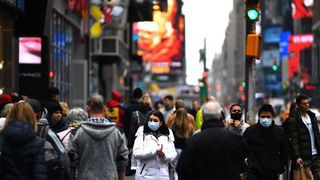
Tourists in Times Square, New York City, on March 13, 2020. The World Health Organization classified Coronavirus as a global pandemic two days prior.
Their Advice for Taking Care of Each Other
"This is impacting a lot of people and their jobs. I have nannies to help with childcare—if you’re telling them to not come in, realize that could have a trickle-down effect in terms of their income. So, if you have the means, continue paying people. When you’re going out and shopping, don’t buy more than you need. That means there are multiple people and families that are going without. This is the time to be looking out for other people, too." —Dr. Elliott
"Check in on your elderly neighbors, your friends and family who are a little older. Don’t go in-person, but call them and make sure they’re doing okay. We’re so focused on social distancing right now, and we should be, but we also need to be picking up the phone and calling and video chatting as much as possible to make sure that the folks who are most at risk are not forgotten about." —Dr. Raja
Certain names or details may have been been omitted in order to protect healthcare workers' identity. To learn more about COVID-19 and how to take care of yourself, click here.
RELATED STORIES


Rachel Epstein is a writer, editor, and content strategist based in New York City. Most recently, she was the Managing Editor at Coveteur, where she oversaw the site’s day-to-day editorial operations. Previously, she was an editor at Marie Claire, where she wrote and edited culture, politics, and lifestyle stories ranging from op-eds to profiles to ambitious packages. She also launched and managed the site’s virtual book club, #ReadWithMC. Offline, she’s likely watching a Heat game or finding a new coffee shop.
-
 This 5-Minute Moisturizer Hack Is a Beauty Editor Shortcut to Glowy Winter Skin
This 5-Minute Moisturizer Hack Is a Beauty Editor Shortcut to Glowy Winter SkinDry skin? Never met her.
By Ariel Baker Published
-
 Dua Lipa Wears the Moon Boots Trend the Internet Loves to Hate
Dua Lipa Wears the Moon Boots Trend the Internet Loves to Hate"I know a galaxy and I can take you for a ride." —Dua Lipa's Moon Boots
By Kelsey Stiegman Published
-
 Liz Plank Quits Justin Baldoni's "Man Enough" Podcast After Blake Lively Lawsuit
Liz Plank Quits Justin Baldoni's "Man Enough" Podcast After Blake Lively Lawsuit"We all deserve better."
By Alicia Lutes Published
-
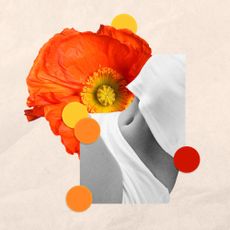 I'm an Egg Donor. Why Was It So Difficult for Me to Tell People That?
I'm an Egg Donor. Why Was It So Difficult for Me to Tell People That?Much like abortion, surrogacy, and IVF, becoming an egg donor was a reproductive choice that felt unfit for society’s standards of womanhood.
By Lauryn Chamberlain Published
-
 CeCe Telfer Has Already Made History
CeCe Telfer Has Already Made HistoryOlympics or not, the track athlete is changing the future of sports forever.
By Megan DiTrolio Published
-
 After Years of Fertility Struggles I Had a Baby—and Then Twins 7 Weeks Later
After Years of Fertility Struggles I Had a Baby—and Then Twins 7 Weeks LaterM.M.LaFleur founder and CEO Sarah LaFleur shares her long, difficult, and surprising journey to parenthood.
By Sally Holmes Published
-
 Dear Survivor: You Are Enough by Merely Existing
Dear Survivor: You Are Enough by Merely ExistingIn honor of Sexual Assault Awareness Month, Rise founder Amanda Nguyen writes a love letter to her younger self.
By Amanda Nguyen Published
-
 Dear Survivor: Tarana Burke Wants You to Hold On to Hope
Dear Survivor: Tarana Burke Wants You to Hold On to Hope"We need to heal—and in order to heal, we must have the capacity to hope that that work to end sexual violence IS possible."
By Tarana Burke Published
-
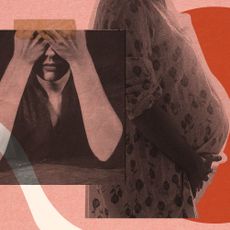 Friendship, Infertility & Moving Forward
Friendship, Infertility & Moving ForwardThere’s no rulebook for navigating your pregnancy while your best friend struggles to conceive. I learned that the hard way.
By Victoria Lamson Published
-
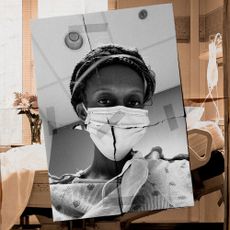 When Your Breast Cancer Journey Takes an Unexpected Turn
When Your Breast Cancer Journey Takes an Unexpected TurnAfter an annual mammogram in June revealed suspicious calcifications, breast cancer survivor Kai McGee underwent a partial mastectomy. Now, she's grappling with the outcome of that surgery.
By Kai McGee Published
-
 On Being a Black Woman, Mother, & Breast Cancer Survivor
On Being a Black Woman, Mother, & Breast Cancer SurvivorKai McGee's intersecting identities have shaped her breast cancer journey—and influence the decisions she's making now about her future.
By Kai McGee Published